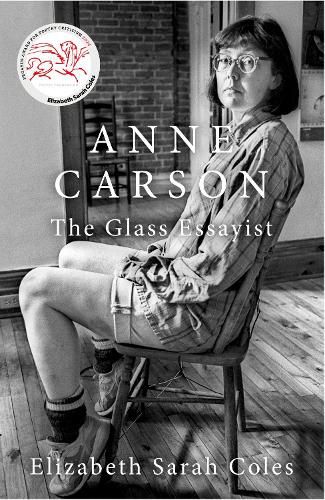Readings Newsletter
Become a Readings Member to make your shopping experience even easier.
Sign in or sign up for free!
You’re not far away from qualifying for FREE standard shipping within Australia
You’ve qualified for FREE standard shipping within Australia
The cart is loading…






The scholar is transparent and accountable, the poet inward and errant: anyone who reads Anne Carson has to suspend many such separations of power. The first monographic study of her work to date, Anne Carson: The Glass Essayist makes the case for the acclaimed poet, classicist, and translator as a remarkable experimental scholar and reader, who rehearses scholarly methods while slipping their constraints of form and emotion. Carson's attention to sources -- ancient and modern, textual or visual -- is one of few constants across almost four decades of her published writing, whose uncertain claims on discipline and genre are claimed here as a certain interpretive style. The book follows Carson's readings through variations in form -- from early academic prose and poems, essays to creative adaptations, and works for performance -- to come to grips with what Coles calls Carson's transparency: not her easiness or literalism, but a taste for the exposure of her presence, process, and intent. Carson's portraits of working perform to readers even where she fantasizes her own erasure; where chance, poetic economy, impersonation, and imitation ride the line of anonymity. Coles situates Carson in a vibrant contemporary conversation around the essay, scholar-poets, and post-critical form, where creation transacts critique, and where roles and prerogatives are reset. Reading Carson as a reader, the book argues, is the most pressing way of reading her now.
$9.00 standard shipping within Australia
FREE standard shipping within Australia for orders over $100.00
Express & International shipping calculated at checkout
The scholar is transparent and accountable, the poet inward and errant: anyone who reads Anne Carson has to suspend many such separations of power. The first monographic study of her work to date, Anne Carson: The Glass Essayist makes the case for the acclaimed poet, classicist, and translator as a remarkable experimental scholar and reader, who rehearses scholarly methods while slipping their constraints of form and emotion. Carson's attention to sources -- ancient and modern, textual or visual -- is one of few constants across almost four decades of her published writing, whose uncertain claims on discipline and genre are claimed here as a certain interpretive style. The book follows Carson's readings through variations in form -- from early academic prose and poems, essays to creative adaptations, and works for performance -- to come to grips with what Coles calls Carson's transparency: not her easiness or literalism, but a taste for the exposure of her presence, process, and intent. Carson's portraits of working perform to readers even where she fantasizes her own erasure; where chance, poetic economy, impersonation, and imitation ride the line of anonymity. Coles situates Carson in a vibrant contemporary conversation around the essay, scholar-poets, and post-critical form, where creation transacts critique, and where roles and prerogatives are reset. Reading Carson as a reader, the book argues, is the most pressing way of reading her now.